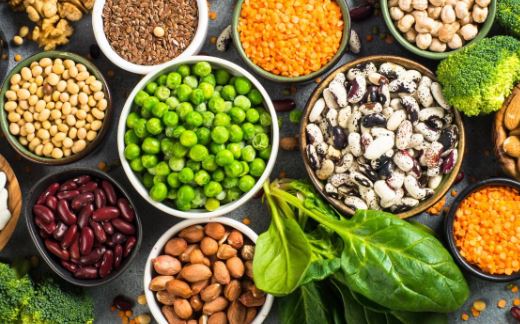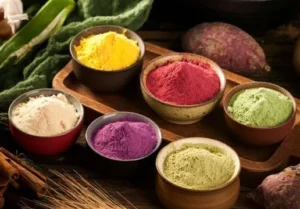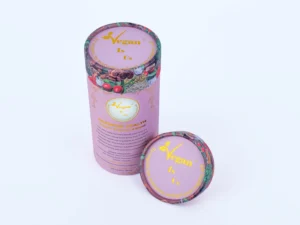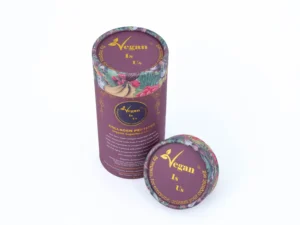Why Do We Need Protein?
Protein is a cornerstone of human nutrition, constituting roughly 17% of the body’s weight. It serves as the primary building block for muscles, skin, internal organs—particularly the heart and brain—as well as eyes, hair, and nails. Additionally, the immune system relies on protein to produce antibodies, which are essential for fighting infections. Furthermore, protein plays a crucial role in regulating blood sugar, metabolising fat, and maintaining energy levels. Protein consists of long chains of amino acids, which the body uses to build, maintain, and repair tissues. Out of the 20 amino acids, nine are considered essential, meaning they must be obtained through our diet. In this blog we explore top 18 vegan protein sources and how to get them.
Plant-Based Protein Sources
While animal-derived foods such as meat and fish are often considered complete protein sources (providing all nine essential amino acids), there are several plant-based sources that also qualify. Some, however, may be lower in specific amino acids like lysine, methionine, cysteine, tryptophan, and threonine. Therefore, a balanced, varied plant-based diet can ensure you get all the essential amino acids by incorporating different protein-rich foods.
How to Get Enough Protein as a Vegan
A deficiency in protein can lead to brittle hair, nails, and skin, delayed wound healing, frequent infections, anaemia, and muscle weakness. However, vegans can meet their protein needs by consuming a diverse range of plant-based protein sources such as legumes, grains, nuts, and seeds, while minimising reliance on highly processed alternatives like vegan cheese.
Pro Tip: To ensure you’re getting all the essential amino acids, combine complementary proteins. For instance, pair grains with legumes (like rice and beans) or nuts with whole grains (such as peanut butter on wholemeal bread).
How Much Protein Do You Need?
The Reference Nutrient Intake (RNI) for an average adult is set at 0.75g of protein per kg of body weight per day. For example:
- A 60kg adult requires 45g of protein daily (60 x 0.75g).
- A 74kg adult requires 55g of protein daily (74 x 0.75g).
This recommendation applies to sedentary individuals. However, if you are more active, you may require higher amounts to support muscle maintenance and recovery.
Pro Tip: If you are highly active or an athlete, aim for 1.2-2.0g of protein per kg of body weight daily, depending on your training intensity. Moreover, spreading your protein intake evenly across meals can optimise muscle repair and growth.
Can You Eat Too Much Protein?
Excessive protein intake, particularly from animal sources like red and processed meats, has been linked to potential health risks. However, research suggests that in otherwise healthy individuals, high-protein diets do not necessarily lead to kidney damage or bone loss. In fact, higher protein intake may actually benefit older adults by reducing muscle loss. Although limited, some research shows that high-protein vegan diets could be equally beneficial, but balance and variety are still key.
Pro Tip: Focus on whole food protein sources rather than heavily relying on processed protein supplements. This approach ensures you benefit from the fibre, vitamins, and minerals that whole foods provide.
Can Vegan Athletes Get Enough Protein?
Athletes following a vegan diet must ensure they get sufficient energy, protein, and key nutrients like vitamin B12, zinc, iron, and omega-3 fatty acids. Although some studies indicate potential challenges in digestion and nutrient absorption, a well-planned vegan diet can fully support athletic performance.
Pro Tip: Incorporate protein-rich snacks like roasted chickpeas, edamame, or a handful of nuts after workouts to aid recovery. If you find it challenging to meet your protein needs through food alone, a plant-based protein powder can help.
Top 18 Vegan Protein Sources
Here are some of the best plant-based protein sources, along with helpful tips for incorporating them into your diet. These sources provide not only protein but also various additional health benefits, from heart health to muscle recovery.
- Hemp Seeds – 30g protein per 100g
Hemp seeds are a complete protein source, meaning they contain all nine essential amino acids and are highly digestible. They also provide omega-3 and omega-6 fatty acids, which support brain and heart health.
Pro Tip: You can sprinkle hemp seeds on salads, blend them into smoothies, or mix them into porridge for a protein boost. To preserve freshness, store them in the fridge. - Pea Protein – 24g protein per 100g
Pea protein, derived from yellow split peas, is a high-quality protein that also contains all nine essential amino acids, making it ideal for muscle maintenance and recovery.
Pro Tip: Add pea protein powder to smoothies, pancakes, or baked goods for an easy protein boost. For the best results, opt for unsweetened varieties to avoid added sugars. - Flaxseeds – 18g protein per 100g
Rich in protein and omega-3 fatty acids, flaxseeds support overall health, digestion, and heart function.
Pro Tip: Grind flaxseeds before use to enhance nutrient absorption. Add them to smoothies, oatmeal, or use as an egg replacer in baking (1 tbsp ground flaxseed + 3 tbsp water = 1 egg). - Hemp Protein – 50g protein per 100g
A protein powerhouse, hemp protein is packed with amino acids and is easily digestible.
Pro Tip: Use hemp protein powder in post-workout shakes or mix it into energy bars for a quick protein fix. Combine with fruit for a balanced snack. - Peanuts – 25.8g protein per 100g
Peanuts provide an excellent source of protein, although they are lower in lysine and methionine.
Pro Tip: Choose natural peanut butter without added oils or sugars. Spread it on wholemeal toast or mix it into stir-fries for a protein-packed meal. - Pumpkin Seeds – 24.4g protein per 100g
Pumpkin seeds are rich in protein but low in methionine. Best when paired with oats or soy for a complete protein profile.
Pro Tip: Roast pumpkin seeds with a sprinkle of sea salt for a crunchy snack. Add them to salads or granola for extra texture and protein. - Tempeh – 20.7g protein per 100g
Tempeh, a fermented soy product, offers a complete protein and promotes gut health thanks to its probiotics.
Pro Tip: Marinate tempeh in soy sauce, garlic, and ginger before grilling or sautéing. It’s also great when crumbled into chilli or tacos. - Cashew Nuts – 17.7g protein per 100g
Cashew nuts are a good protein source, also rich in iron and zinc.
Pro Tip: Blend cashews with water, nutritional yeast, and spices to create a creamy vegan cheese sauce. Use it in pasta, nachos, or as a dip. - Soya Mince – 16.6g protein per 100g
Soya mince is an excellent meat substitute with a high protein content.
Pro Tip: Use soya mince in place of ground meat in Bolognese, chilli, or shepherd’s pie. Rehydrate it with vegetable stock for added flavour. - Tofu – 16.5g protein per 100g
A versatile soy-based protein option, tofu can be used in a variety of dishes.
Pro Tip: Press tofu to remove excess water before cooking. Marinate it and grill, bake, or stir-fry for a delicious protein-rich meal. - Chia Seeds – 16.5g protein per 100g
Chia seeds are rich in protein and serve as a great egg replacer in vegan baking.
Pro Tip: Make chia pudding by soaking chia seeds in plant-based milk overnight. Top with fresh fruit and nuts for a nutritious breakfast or dessert. - Lentils (Boiled & Drained) – 8.8g protein per 100g
Lentils are a nutritious and fibre-rich legume that pairs well with grains.
Pro Tip: Cook lentils in bulk and freeze them for quick meals. Add them to soups, stews, or salads for a protein and fibre boost. - Chickpeas (Canned) – 7.2g protein per 100g
Chickpeas are a versatile protein source, perfect for curries, salads, and hummus.
Pro Tip: Roast chickpeas with olive oil and spices for a crunchy snack, or blend them into hummus for a creamy dip. - Baked Beans – 5g protein per 100g
A convenient and affordable source of protein, rich in fibre.
Pro Tip: Opt for low-sugar baked beans and pair them with wholemeal toast or baked potatoes for a complete meal. - Quinoa – 4.4g protein per 100g
Quinoa is a complete protein source, offering all essential amino acids.
Pro Tip: Use quinoa as a base for salads, stir-fries, or porridge. Rinse it thoroughly before cooking to remove any bitterness. - Brown Rice (Boiled) – 3.6g protein per 100g
Brown rice is low in threonine and lysine but pairs well with legumes for a balanced protein intake.
Pro Tip: Combine brown rice with lentils or beans for a complete protein meal. Cook it in vegetable stock for extra flavour. - Buckwheat (Cooked) – 3.4g protein per 100g
Buckwheat is a gluten-free grain that is rich in protein and fibre.
Pro Tip: Use buckwheat flour for pancakes or bake with it for a gluten-free option. Cook buckwheat groats as porridge or a grain bowl base. - Oats (Boiled) – 2g protein per 100g
Oats are a nutritious source of slow-releasing energy and protein.
Pro Tip: Add protein powder, nuts, or seeds to your porridge for a higher-protein breakfast. Overnight oats are a convenient option as well.
Key Takeaways
Incorporating a variety of plant-based proteins into your diet can provide all the nutrients your body needs to thrive. However, for those looking for a convenient and nutrient-dense way to boost your protein intake, consider trying our Protein Peptides | Organic Superfood Blend. Made with organic ingredients like Pea Protein, Flaxseed, Hemp Protein, and Lucuma, this blend offers a powerful combination of plant-based proteins and superfoods, including Raw Cacao, Spirulina, Turmeric, Barley Grass, Aronia Berry, Matcha, and Shiitake Mushroom. This convenient blend not only provides a protein boost but also delivers antioxidants, anti-inflammatory compounds, and adaptogens that support immune function, energy, and overall wellness. Try it today for a quick, nutritious way to meet your protein needs.
Pro Tip: To better track your protein intake, consider keeping a food diary for a week. This can help you identify any gaps and ensure you’re meeting your daily requirements. Experiment with different plant-based recipes to make your meals both exciting and nutrient-packed!







